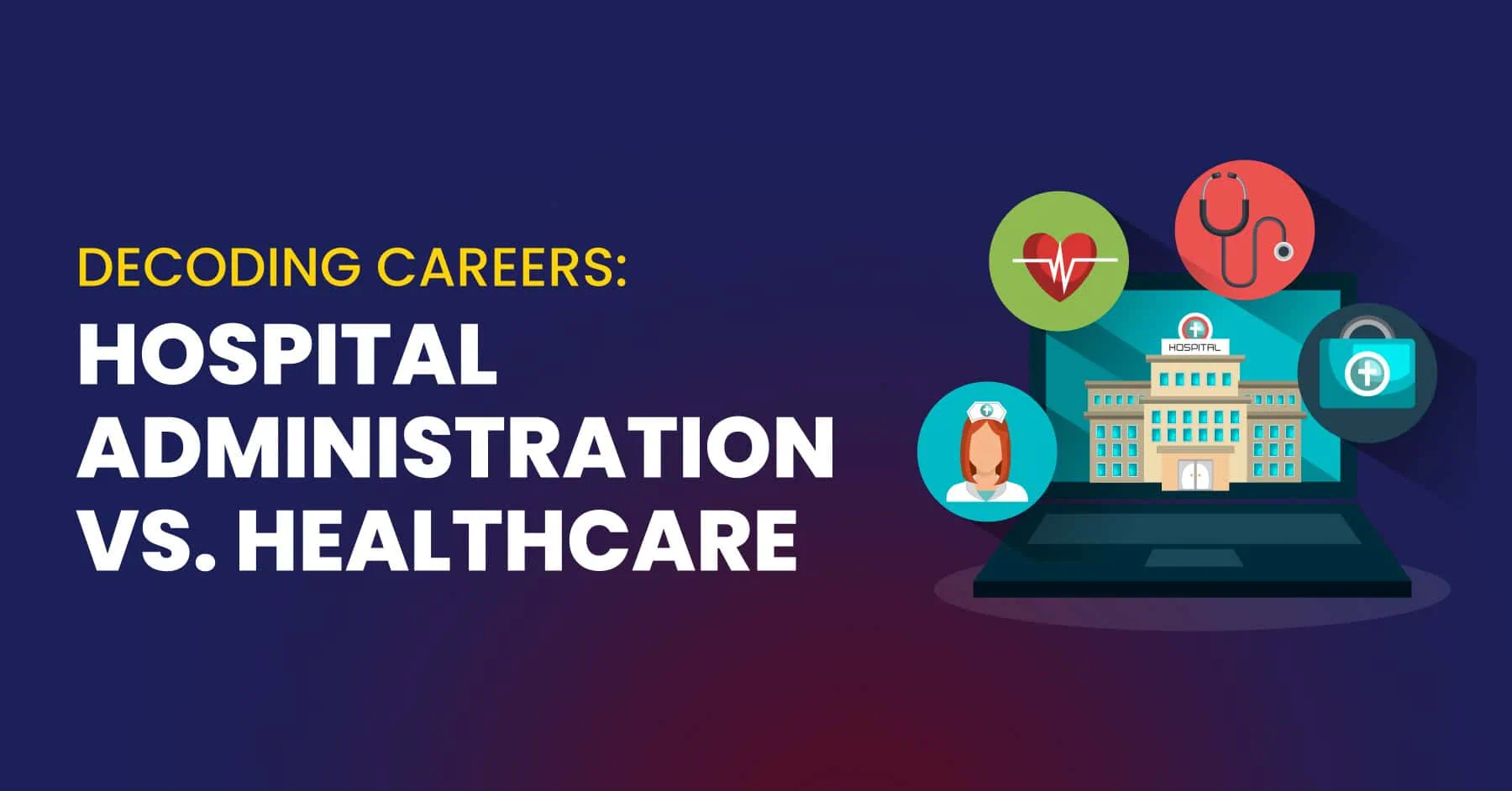Confused between Healthcare Management, Hospital Administration, and Hospitality careers after 12th? Your choice could shape your future!
The rise of the healthcare industry is due to reasons such as an aging population and more chronic health conditions; people are seeking better care, newer technologies, and more accessible health services.
A doctor’s appointment costs an average of Rs 600-1500 and the average cost of child delivery ranges up to a minimum of Rs 50,000 to Rs 80,000 at a private hospital.
As healthcare spending continues to rise, the demand for trained professionals in healthcare management and hospital administration also increases.
This growth paints a clear picture: the healthcare sector will continue to be a major force in India’s economy, creating new opportunities in management, operations, technology, and patient care.
Now the big question: Healthcare Management or Hospital Administration, which career suits you better? Let’s compare both to help you make an informed choice.
👉 Unsure about your healthcare career path? Explore our healthcare-focused UG programs.
What is Healthcare Management?
Healthcare management is what keeps the healthcare system running and makes sure people get the best care possible. They’re the ones who lead teams, keep things organized, and make sure everyone is on the same page.
Their job is to ensure that patients get top-notch care, while also helping staff meet performance goals and improving overall efficiency. It’s one of the fastest-growing fields, according to the Bureau of Labor Statistics, mainly because the healthcare industry is growing and evolving quickly.
Key Responsibilities in Healthcare Management
Healthcare management is a broad phrase that encompasses a wide range of job positions. These individuals have a wide range of responsibilities.
|
Key Responsibilities |
Career Opportunities |
|
They oversee daily operations to ensure the organization runs smoothly |
Hospital Administrator |
|
They manage and support staff to maintain efficient teamwork and workflow. |
Clinic or Practice Manager |
|
They ensure patients receive high-quality and timely care. |
Healthcare Project Manager |
|
Handle budgeting, financial planning, and resource allocation. |
Health Services Manager |
Choose Healthcare Management if:
- You are interested in the entire healthcare industry, covering areas such as public health, insurance, and healthcare policy.
- You want to plan and strategise large-scale programs or policies that impact a bigger group of people.
- You like to have a wider range of career options across various industries like hospitals, clinics, insurance companies, or public health organisations.
👉 Explore how Inspiria’s BBA in Hospital Management builds leadership, planning, and strategic skills for the healthcare industry.
What is Hospital Administration?
Hospital administration works like the brain of a healthcare organisation, keeping everything connected and running the way it should. Administrators make sure the facility operates smoothly by handling the day-to-day systems and bigger organizational needs.
They take care of things like managing staff, budgets, supplies, patient services, and building operations. They also handle hiring, training, scheduling, billing, and keeping the facility compliant with regulations. In short, they keep all the moving parts working together so patients receive safe, reliable, and high-quality care.
Key Responsibilities and Career Opportunities in Hospital Administration
|
Key Responsibilities |
Career Opportunities |
|
Overseeing the day-to-day functioning of the hospital, including departments and services. |
Hospital Administrator |
|
Managing budgets, financial operations, and resource allocation within the hospital. |
Director of Patient Services |
|
Supervising hospital staff, coordinating schedules, and supporting workplace efficiency. |
Hospital Operations Manager |
|
Ensuring the hospital meets safety standards, regulations, and delivers quality patient care. |
Facility or Support Services Manager |
Choose Healthcare Management if:
- You enjoy working in one setting and want to make sure a single hospital or clinic runs smoothly every day.
- You like being involved in real, on-the-ground operations where your decisions directly improve patient care.
- You’re drawn to clear career paths like Hospital Superintendent, COO, or Nursing Home Administrator.
👉 See how Inspiria prepares you for healthcare careers with training & placements.
Key Responsibilities in Hospital Administration
|
Key Responsibilities |
Career Opportunities |
|
Overseeing the day-to-day functioning of the hospital, including departments and services. |
Hospital Administrator |
|
Managing budgets, financial operations, and resource allocation within the hospital. |
Director of Patient Services |
|
Supervising hospital staff, coordinating schedules, and supporting workplace efficiency. |
Hospital Operations Manager |
|
Ensuring the hospital meets safety standards, regulations, and delivers quality patient care. |
Facility or Support Services Manager |
Key Differences: Healthcare Management vs. Hospital Administration
|
Factors |
Healthcare Management |
Hospital Administration |
|
Scope of Work |
Focuses on overall healthcare policies, regulations, financial planning, and strategic management across multiple healthcare sectors. |
Manages the day-to-day operations of hospitals, ensuring smooth functioning, patient satisfaction, and staff coordination. |
|
Workplace |
Works in hospitals, insurance firms, pharmaceutical companies, healthcare startups, consulting firms, and government agencies. |
Primarily works in hospitals, clinics, nursing homes, rehabilitation centers, and specialized healthcare facilities. |
|
Skillset Required |
Leadership, policy-making, budgeting, regulatory knowledge, business acumen, data analysis, and strategic planning. |
Team management, crisis handling, patient service management, operations management, inventory control, medical ethics, and compliance. |
|
Key Responsibilities |
1) Developing healthcare policies and strategies. 2) Coordinating with government agencies and private firms. 3) Implementing new healthcare technologies. 4) Managing health insurance and regulatory compliance. |
1) Overseeing hospital staff, including doctors and nurses. 2) Ensuring high-quality patient care and service efficiency. 3) Handling hospital infrastructure, maintenance, and supply chain. 4) Managing hospital budgets and financial performance. |
|
Career Growth |
High demand in both private and public healthcare sectors, including corporate hospitals and healthcare consultancy firms. |
Growing need for hospital administrators, medical superintendents, and healthcare managers due to expanding healthcare infrastructure. |
|
Average Salary in India |
₹5-12 LPA (varies by industry, specialization, and experience). |
₹4-10 LPA (depends on the hospital, location, and experience level). |
|
Future Scope |
With advancements in AI, digital health records, and telemedicine, the demand for healthcare managers is increasing. |
Increased demand for efficient hospital administrators due to the growth of private hospitals, multi-specialty healthcare facilities, and medical tourism in India. |
|
Who Should Choose? |
Students interested in policy-making, finance, and the business side of healthcare. |
Students who prefer hospital-based roles, patient interaction, and direct management of healthcare services. |
👉 Find out which career fits you — get expert guidance
How to Decide whether to choose Healthcare Management or Hospital Management?
Although the ultimate decision is in your hands but we can help you with a few key things to think about before choosing Healthcare Management and Hospital Administration.
What drives your passion?: Are you more pulled towards business and strategy, which can be better for Healthcare Management, or do you enjoy improving day-to-day operations, which is good for Hospital Administration?
Keep your long-term objectives in mind: Think about whether you wanna make a difference on a larger group of people through policy or systems(Healthcare Management), or just focus on running a single facility efficiently (Hospital Administration)?
Check out the courses and qualifications you can pursue: A BBA in Healthcare Management gives you broad industry knowledge, wherein you can go for an MBA as well, which will give you an even better perspective on the field. While programs in Hospital Administration (like a BHA and later MHA or MBA) focus more on managing a facility.
Follow your strengths: Are you stronger in leadership, problem-solving, and strategic thinking, or in organizing, coordinating, and managing people directly?
Keep in mind the influence you want to have: Do you want to influence healthcare on a community or system-wide level, or do you want to make a difference by putting efforts into day-to-day care and operations of a single facility?
👉 See if the BBA Hospital Management curriculum fits your goals.
Conclusion
To decide between Healthcare Management and Hospital Administration really depends on what exactly excites you and where you would like to work.
If you enjoy planning, strategising, and shaping the way healthcare systems run, Healthcare Management could be your path. But if you like working directly on the ground, making sure a hospital or clinic runs smoothly, and seeing the direct results of your efforts on patients, Hospital Administration might be a better fit.
Both fields are growing fast and offer plenty of opportunities, so go with what feels right for you and where you can make the biggest impact.









